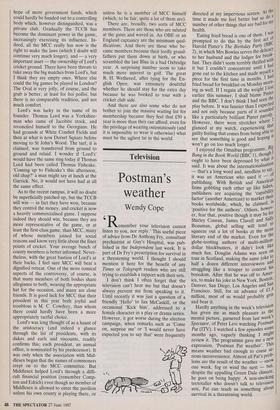Television
Postman's weather
Wendy Cope Remember your television cannot listen to you, nor reply.' This useful piece of advice from Dr Anthony Fry, consultant psychiatrist at Guy's Hospital, was pub- lished in the Independent last week. It is part of Dr Fry's prescription for survival in a threatening world. I thought I should mention it here for the benefit of any Times or Telegraph readers who are still trying to establish a rapport with their sets.
I don't think I often forget that the television can't hear me but that doesn't always prevent me from speaking to it. Until recently it was just a question of a friendly `Hello' to Ian McCaskill, or the occasional 'Kick him', addressed to a female character in a play or drama series. However, it got worse during the election campaign, when remarks such as 'Come on, surprise me' or `I would never have expected you to say that' were frequently directed at my impervious screen. At the time it made me feel better but so do a number of other things that are bad for MY health. Eating fried bread is one of them. I viasf prompted to do this by the first act o‘., Harold Pinter's The Birthday Party (BB t" 2), in which Mrs Bowles serves the delicacy to her husband and the lodger for break- fast. They didn't seem terribly thrilled' 0, it but I couldn't concentrate until I hat' gone out to the kitchen and made myself a. piece for the first time in months. I had fried bread for breakfast on Monday morn- ing as well. If I regain all the weight I lost earlier this summer, I shall blame and the BBC. I don't think I had seen the, play before. It was funnier than I expected and not only because parts of it sounded like a particularly brilliant Pinter par°dYi However, there were stretches whet! t glanced at my watch, experiencing that guilty feeling that comes from being able to see that something is good and hoping It won't go on too much longer. Pinter I enjoyed the Omnibus programme, 13ii Bang in the Book World (BBC 1), though' ought to have been depressed by what It said. It was about the internationalisation that's a long word and, needless to say,, , it was an American who used it — publishing. With British and American firms gobbling each other up like fishes, publishers are acquiring the `capability factor' (another American) to market then books books worldwide, which, he claimed, Is `positive for the authors'. Others, howev- er, fear that, positive though it may be for Shirley Conran, James Clavell and SOY Beauman, global selling will tend t° squeeze out a lot of books at the more literary end of the market. Even for the globe-trotting authors of multi-million- dollar blockbusters, it didn't look like much fun. Douglas Adams was seen on tour in Scotland, making the same joke to half a dozen different interviewers and struggling like a trouper to conceal lus boredom. After that he was off to Amer- ica, to make his joke in New York, Boston, Denver, San Diego, Los Angeles and San Francisco. Still, for an advance of million, most of us would probably gint and bear it. Hardly anything in the week's television has given me as much pleasure as the mental picture, garnered from last week s Spectator, of Peter Levi watching Postman Pat (ITV). I watched a few episodes some months ago, vaguely thinking I might review it. The programme gave me a new expression, `Postman Pat weather'. This means weather bad enough to cause se- rious inconvenience. Almost all Pat's prob- lems are the result of the weather — snow one week, fog or wind the next — but, despite the appalling Green Dale climate, he goes on being happy. A non-smoking teetotaller who doesn't talk to television sets, Pat can teach us something about survival in a threatening world.









































































 Previous page
Previous page